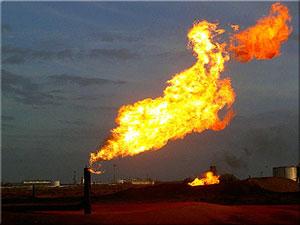Fight over natural gas gets heated
(Image by Flickr user todbaker (cc:by-sa))
This story was originally covered by PRI's Living on Earth. For more, listen to the audio above.
As people search for alternatives to coal and oil, natural gas has emerged as a possible alternative. "If you replace an existing coal fired power plant with a new natural gas plant," Chris Flavin of the Worldwach institute told PRI's Living on Earth, "you get about a two-thirds reduction in the carbon dioxide emissions." Natural gas also releases fewer pollutants that are potentially harmful to people. And the vast natural reserves inside the United States make natural gas an attractive source of energy for American lawmakers.
Some environmentalists, however, are questioning the environmentally destructive method used to extract natural gas from the earth. Hydraulic fracturing, or "fracking," releases natural gas from deep in the earth by injecting water and chemicals into layers of shale. Some believe that fracking can ruin ground water and hurt the environment.
A new documentary called Gasland calls attention to the potential harm that natural gas drilling can cause. At a recent Environmental Protection Agency hearing on fracking, Wyoming rancher John Fenton told the audience that his water was contaminated, saying:
I don't have a problem with production of oil, or natural gas or any of our other natural resources, but it shouldn't come at the expense and the degradation of the things we truly can not live without: our air, our water, and our health. The monetary gains, the jobs are nice, but we have to look after health and basic human needs of everyone on this planet.
The rush toward natural gas, and the rapid expansion of the industry, has lead to a situation where regulations are struggling to keep up, Flavin told Living on Earth. The regulatory structure around natural gas hasn't had time to develop, and companies haven't taken to time to solid environmental practices. He told Living on Earth:
This sort of "gold rush" type of boom mentality has meant that there are practices being employed that are in fact leading to various kinds of environmental problems including the contamination of water supplies, unexpected blowouts of wells, air pollution, and just disruption from turning what had been relatively pristine rural areas into semi-industrial zones.
At the same time, members of the coal lobby have been actively working to undermine natural gas. "Behind the scenes the coal industry has been working very hard to really stop the development of natural gas generation in its tracks," according to Flavin. He told Living on Earth, "this sort of effort by the coal industry is doing enormous environmental damage."
In spite of the shortcomings, many believe that natural gas can help the environment. "Easy to transport, easy to use, cheap and relatively clean," The Union of Concerned Scientists calls natural gas "a good way to improve our energy system in the short run." The organization does not believe that natural gas alone is a sustainable solution to global warming, air pollution and resource depletion. But with advances in technology, and as a supplement to renewable resources like wind and solar, natural gas will almost certainly be a part of any green energy future.
You can watch a trailer for Gasland below:
Hosted by Steve Curwood, "Living on Earth" is an award-winning environmental news program that delves into the leading issues affecting the world we inhabit. More "Living on Earth."
